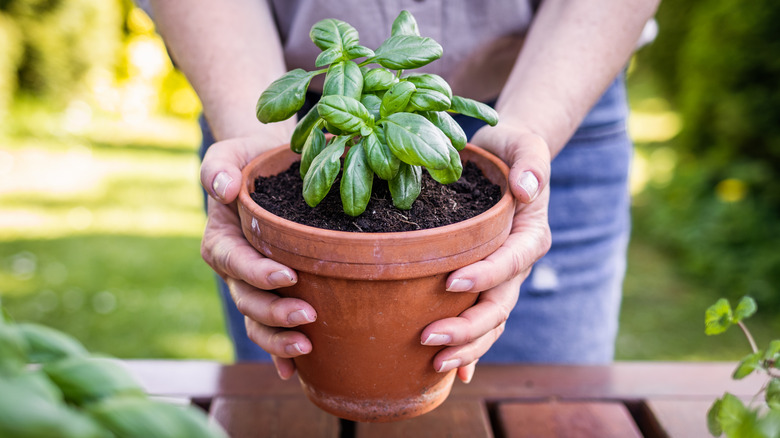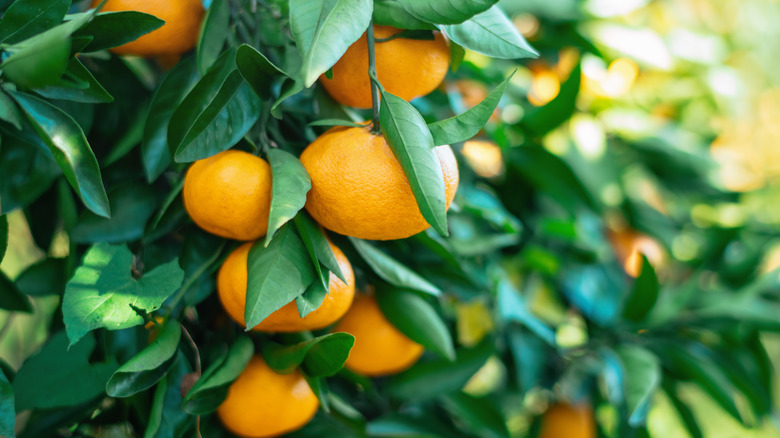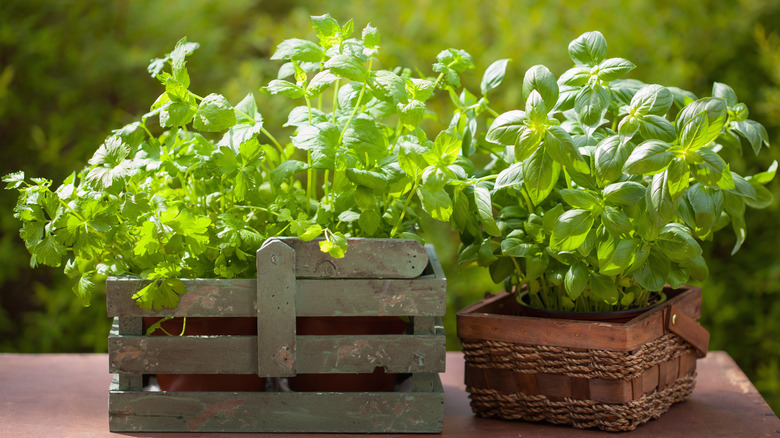The Fragrant Herbs That Will Keep Aphids And Other Pests Off Of Your Citrus Trees
If you have citrus trees in your yard, you know they can be susceptible to any number of pests or diseases. There's one way to help deter pests that might damage your citrus trees that is relatively easy, inexpensive, and all-natural: plant some fragrant herbs in your flower beds or containers. The volatile essential oils found in herbs such as basil, lavender, thyme, and flowering catmint will keep many harmful insects away from your citrus trees.
Since citrus trees are grown in full sun in warmer growing zones, it makes sense to have companion plants that also like those growing conditions. There are a number of fragrant sun-loving culinary herbs and Mediterranean herbs that are easily grown in containers or beds, such as basil, thyme, mint, rosemary, chives, lavender, dill, and oregano. Their strong scents can help to repel insect pests like aphids, flies, mosquitoes, and whiteflies.
An added but unexpected bonus: in addition to the fragrant leaves deterring harmful insects, these herbs also bear fragrant flowers that attract a variety of pollinators. These flowers are also enjoyed by beneficial insects like hoverflies, ladybugs, and lacewings that feed on common pests like aphids. It's also pleasing to grow culinary herbs near citrus trees as their scents and flavors complement one another. Following the correct planting methods will help easily introduce these companion plants into your garden.
Planting herbs near citrus trees
If you're growing citrus trees in your garden, it is crucial to plant them in rich, fertile soil, and take steps to make sure the soil stays healthy and full of nutrients to help these trees thrive. Citrus trees grow best in fertile soil with plenty of organic matter like compost, as well as excellent drainage. These are also the best soil conditions for growing fragrant herbs.
While it's not advisable to plant certain herbs near your citrus trees, such as mint, which can be invasive, or dill, which tends to reseed itself vigorously, other herbs make good perennial companion plants. These include oregano or lavender, both of which like full sun, and loamy, well-drained soil. These plants will increase in size slightly each year, so give them some space to grow. Also, make sure they're several feet from the base of the citrus tree so they don't compete with the root system for nutrients.
Other herbs to plant in beds near your citrus trees include thyme and flowering catmint. Thyme is a low-growing, semi-perennial plant that comes in many different varieties. There is even a lemon thyme which would make a great companion for lemon trees. Flowering catmint has a tendency to get big, so it needs to be divided every two to three years. Planting it near your citrus trees will attract many beneficial pollinators including hummingbirds. It also repels ants, aphids, and destructive Japanese beetles.
Growing herbs in containers near citrus trees
Growing herbs in containers gives you lots of flexibility in terms of soil and the types of herbs you can grow. It also lets you place them in sunny spots right near your citrus trees where they will still help attract beneficial insects — and deter undesirable ones. You can plant seeds in the containers, or obtain seedlings and plant those. You can also keep perennial herbs such as rosemary or lavender in containers year-round if you live in a warm enough climate.
Container plants are also the best option if you grow your citrus trees in pots that you move indoors for the winter. When you move the trees outside for the warmer months, add some potted herbs to help protect your citrus trees from aphids and other pests. You can arrange your containers any way you like on your patio or in your yard to create a dynamic design.
Some perennial herbs really should be planted in containers so they don't spread invasively in your garden, like mint. Mint's strong scent deters many insect pests such as aphids, fleas, and ants, but its roots can spread aggressively in the garden. Lemon balm is another fragrant herb that grows vigorously and tends to be invasive, but it grows fine in a pot. Lemon balm's scent makes it a lovely companion plant for citrus trees, and its leaves repel gnats, mosquitoes, and other flying pests.



